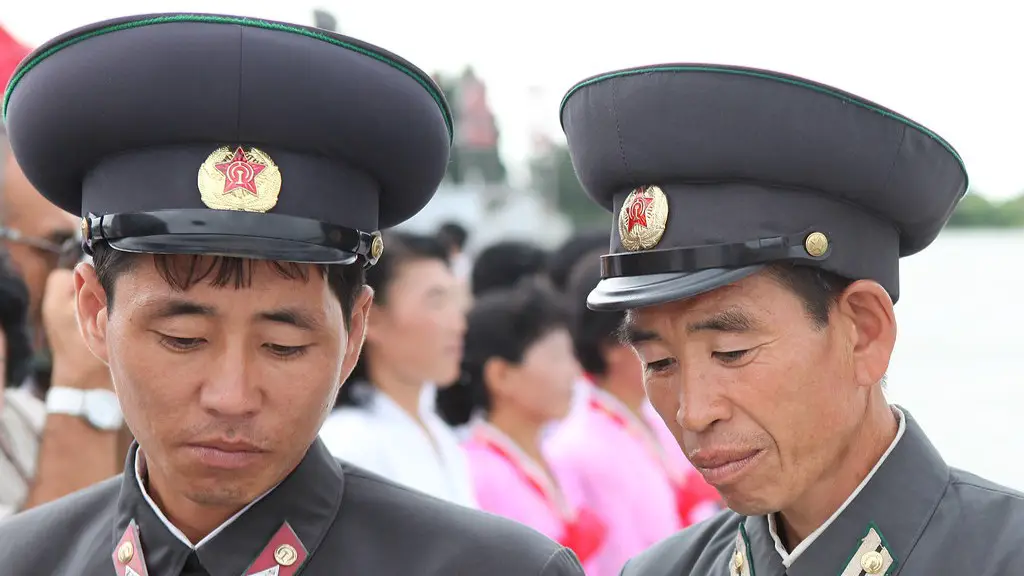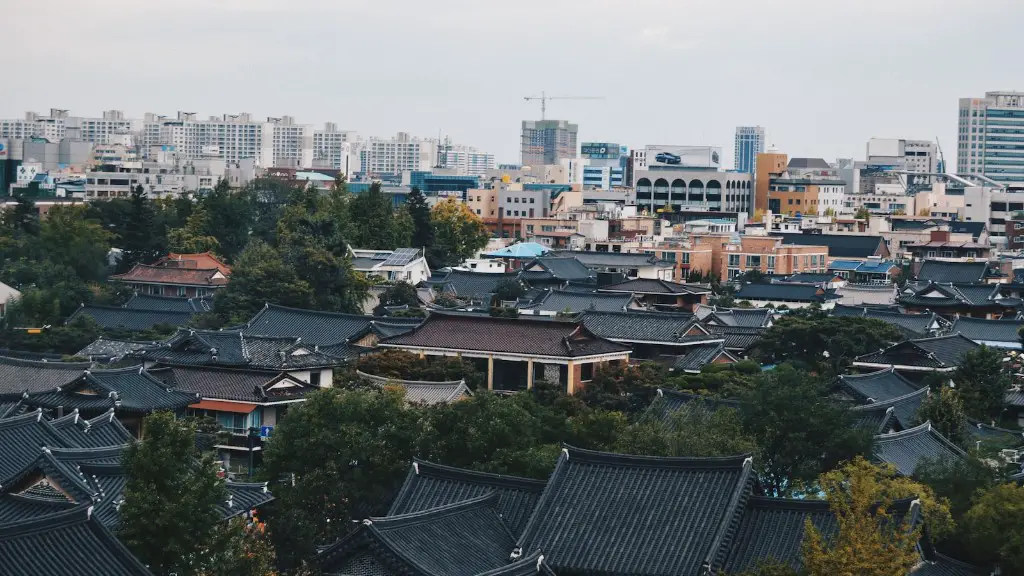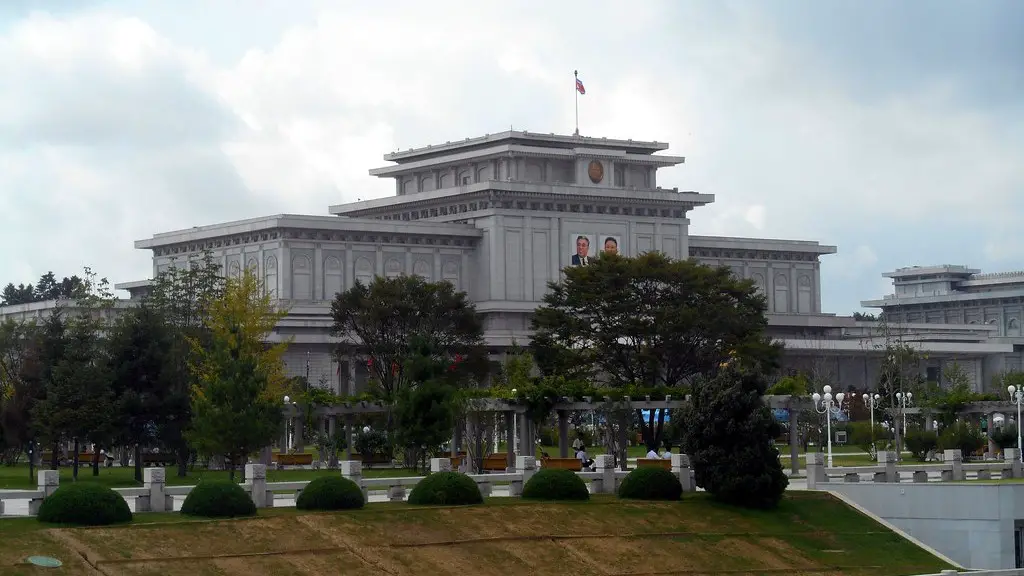The hermit kingdom of North Korea is known for its nuclear capabilities, but just how advanced are those weapons and what else is it capable of? In this article, we will explore the history, technologies and possible threats that North Korea could pose to the international community.
An Isolated Regime
North Korea, a small self-declared sovereign state in East Asia, is considered one of the most isolated countries in the world. Though governed by a totalitarian regime, very few outsiders have received the privilege of entering North Korea for any extended period of time. Because of this, opinions and knowledge of what occurs in North Korea are generally limited. What is known is that the hermit kingdom is a heavily-armed nation with a rapidly expanding military.
The leader of North Korea, Kim Jong-un, has been known to make drastic and unpredictable decisions when it comes to his country’s nuclear ambitions. It was Kim Jong-un who announced in 2017 that North Korea had the capability to deploy a nuclear warhead on an ICBM, something that was confirmed a few months later. Seoul estimates that North Korea may have as many as 60 nuclear warheads, though this number is in dispute.
Missile Development
North Korea is said to have a large stockpile of up-to-date weapons and missiles. According to some reports, the size and capabilities of their missile arsenal is on the rise. It is estimated that North Korea possess several hundred land-based missiles, ranging in payloads from 10kg to 10 tons, as well as missiles that could deliver warheads up to 6,000km away.
The majority of North Korean missiles are liquid-fueled, made from components of Chinese, Russian and Ukrainian origin. However, over the past few years, North Korea has been hard at work on its solid-fueled ballistic missile capability. This technology is favored by Western militaries due to its higher reliability and faster reaction time.
Technological Advancements
In addition to its nuclear and missile capabilities, North Korea is steadily advancing in many other areas of technology. The country is reported to have a highly advanced cyber-hacking program, and has been implicated in cyber-attacks in countries such as South Korea, Japan and the United States.
North Korea is also developing an unmanned aerial vehicle (UAV) program, with some reports stating that the country’s UAVs have ranges of several hundred kilometers and can fly at high altitudes for extended periods of time. The country is also pushing for technological advancements in artificial intelligence (AI) and robotics.
Possible Threats
Knowing the capabilities of North Korea is important, as it will give us a better understanding of what the country is capable of. While the regime’s nuclear ambitions are widely known, they are not the only threats that North Korea poses. South Korea believes that North Korea could deploy international hackers to conduct cyber-attacks, or send UAVs to conduct reconnaissance or surveillance missions.
North Korea has also been known to conduct cyber espionage on South Korea, as well as other countries. It is possible that North Korea could employ AI and robotics to conduct surveillance or propagate misinformation.
The View From The International Community
The international community views North Korean capabilities with trepidation. Diplomatic relations with the hermit kingdom have been strained for decades, and the threat of a nuclear attack has cast a pall of uncertainty over much of the East Asia region. However, despite the dire warnings from the international community, there has yet to be any actual conflict between North Korea and foreign powers.
Some experts have argued that North Korea’s true power lies not in its nuclear arms, but in its ability to influence global media and politics. The country is thought to possess a sophisticated propaganda apparatus, and is said to be a master of manipulation.
Cortex Of Knowledge
North Korea has established a powerful infrastructure of information and knowledge. It is believed that the country possesses detailed knowledge of international politics, diplomacy and warfare, which they use to their advantage. The hermit kingdom also has an extensive archive of scientific information, ranging from astrophysics to agriculture. This gives North Korea a unique advantage over its neighbors, as they are able to keep up with the latest developments in science and technology.
North Korea is also known to employ “deep fakes” or fake news stories to influence the narrative about its own capabilities. Recently, a North Korean defector unveiled a system of fake news factories, which are believed to be used to confuse and manipulate both domestic and international audiences.
The Effects Of Sanctions
North Korea is subject to a number of sanctions from the United Nations, which are put in place in order to limit the country’s ability to acquire technology and resources for its own advancement. However, contrary to popular belief, many experts have argued that these sanctions are having little to no effect on the hermit kingdom.
Although North Korea has historically been isolated from the international community, the country still manages to acquire resources and technology through its large diaspora and international networks. These resources are then allegedly diverted to military or weapons projects. As a result, the effects of international sanctions are largely inconsequential.
Military Strength
North Korea is a heavily-militarized state, with a large standing army. According to 39 North, an independent North Korea monitoring website, the North Korean military has around one million personnel, with a further three million reserves. The country is believed to have a network of underground military bases, as well as a large stockpile of weapons.
North Korea is known to possess WMD including chemical, biological, nuclear and ballistic missiles. It is unknown how many of these weapons systems the country has, but it is believed to have the capabilities to deploy them.
Trade Relations
North Korea’s trade relations are growing, though not in the same exponential manner as its nuclear capability. As of 2021, the country had around 20 trading partners and was involved in trade agreements with countries such as China and Russia. North Korea’s exports include minerals and textiles, while imports include oil and electronic equipment.
Though North Korea has yet to become a fully functioning economy, its trade relations could be crucial in helping it to gain access to resources and technology. There are indications that North Korea may also be seeking to increase its presence on the international stage, as it aspires to become a fully-fledged member of the global community.
Domestic Policies
Lastly, North Korea’s domestic policies are often the cause of controversy. The ruling party is the Supreme People’s Assembly, which is headed by the ruling Kim family. The country operates under a single-party system with a highly centralized economy and a highly repressive political system. Human rights abuses are widespread throughout North Korea and freedom of the press and assembly are non-existent.
North Korea’s domestic policies have resulted in tremendous suffering for the people living there, with severe famine and poverty remaining a major issue in the country. Despite its professed focus on the military and nuclear weapons, North Korea has not been able to improve the conditions of its citizens.




